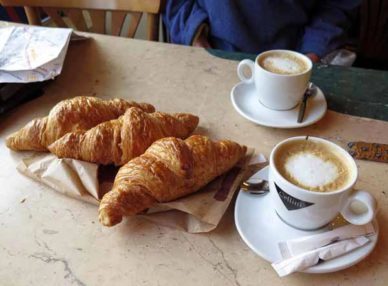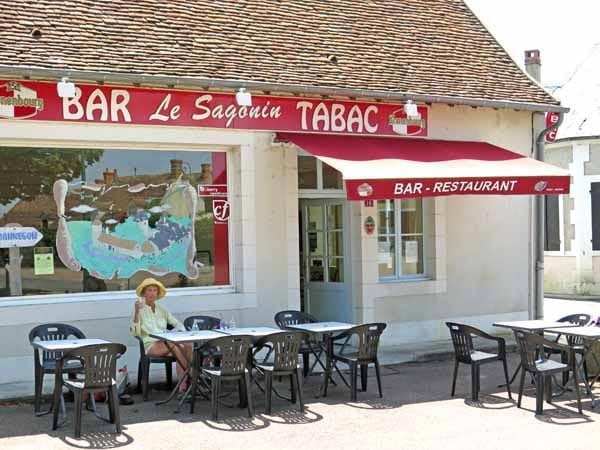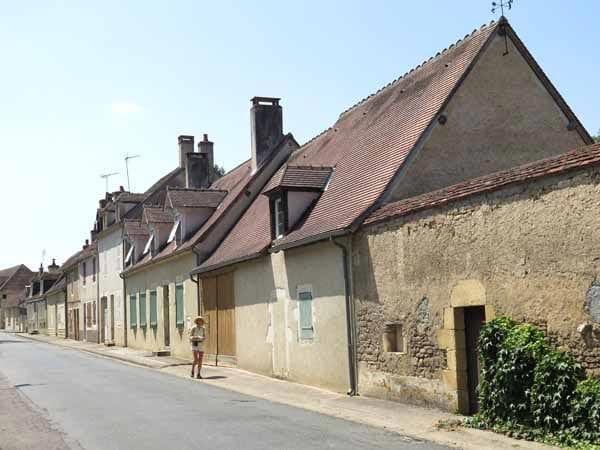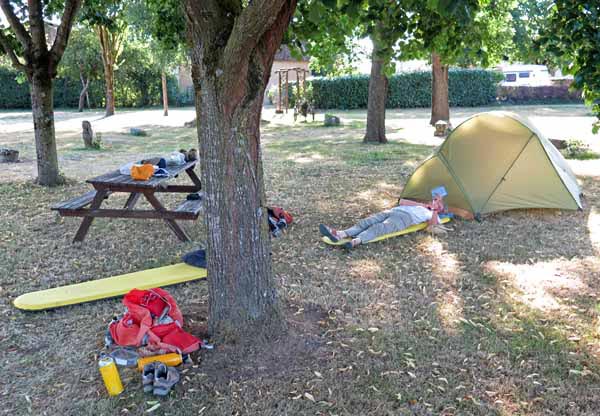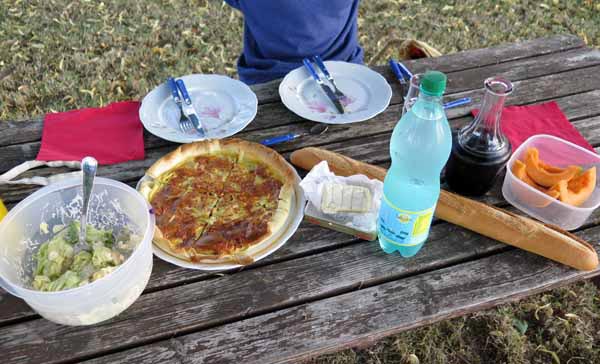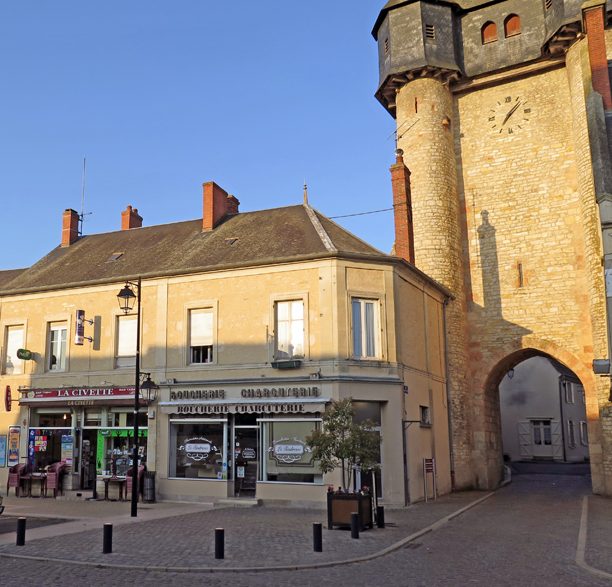
Saturday, 11 July 2015
Distance 22 km
Duration 5 hours 45 minutes
Ascent 20 m, descent 18 m
Map 134 of the
As usual I was flat on the ground when I woke up, but I had got used to the leaky mattress and could sleep quite well without its support. Our many puncture repairs had so far been in vain.
Timing our departure to perfection, we crept away from our slumbering fellow campers and arrived at the boulangerie at 7 o’clock precisely.
Unfortunately the shop was not quite as punctual, and we stood outside with several other people for a few minutes before the rusty roller door creaked up and we all streamed in.
With three warm croissants in a paper bag, we walked on to the bar, taking the steep, narrow lane through the old town that we had discovered yesterday.
The air was fresh, verging on cold, and we were happy to sit inside with our hot coffee, sprinkling crumbs from the croissants all over the table and ourselves. It was well worth the deviation of a kilometre or so.
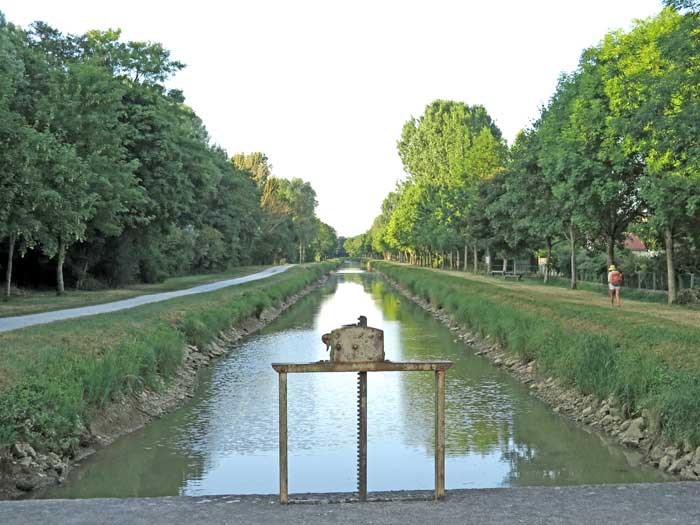
The walk proper began when we got back to the canal. Once past the swimming pool the water reappeared, the banks were smoothly mown and there was a path on each side.
It turned out to be a ‘parcours de santé’, a fitness course for the lucky locals, made up of a sequence of instruments of torture, with helpful instruction boards.
We were invited to jump to and fro over a long bar, walk up a high vertical wall by pulling on a rope and other ghastly things, but we ignored the call.
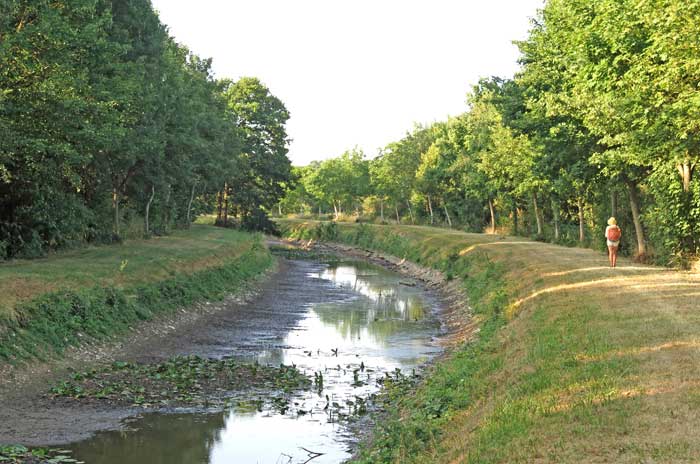
The next couple of hours were easy but uneventful. There was plenty of shade and the air was cool.
The river Auron was never far away, twisting and turning in its bush-choked bed, whereas the canal proceeded in a smooth and predictable way, flanked by a clear track. We could see how useful it would have been as a means of transport in its day.
Meanwhile I was entertained by the dastardly doings of the successors of Diocletian, who were trying to murder each other as quickly as possible.
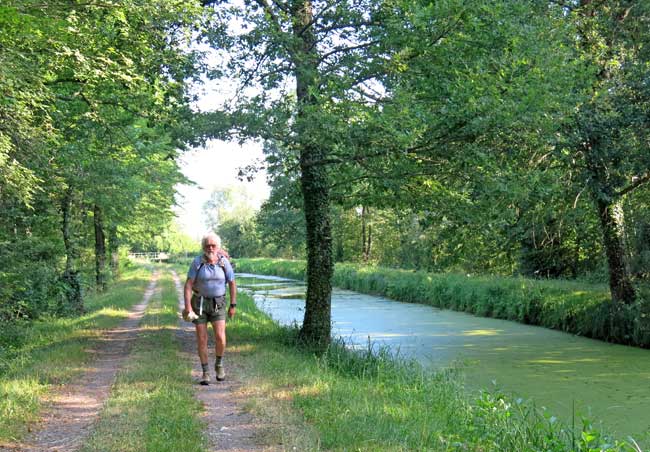
From time to time we passed people in their garden allotments beside the canal, labouring contentedly among rows of lettuces, onions and tomatoes.
We changed sides a couple of times at locks, following the main wheel track, and in due course came to a bitumen road (the D953), at the village of le Pondy.
Next to the bridge was the Auberge du Pont d’Y (a little French pun), which we were delighted to see, as we had been walking for over three hours since breakfast. It was a fine old stone building with a dining terrace at the side.
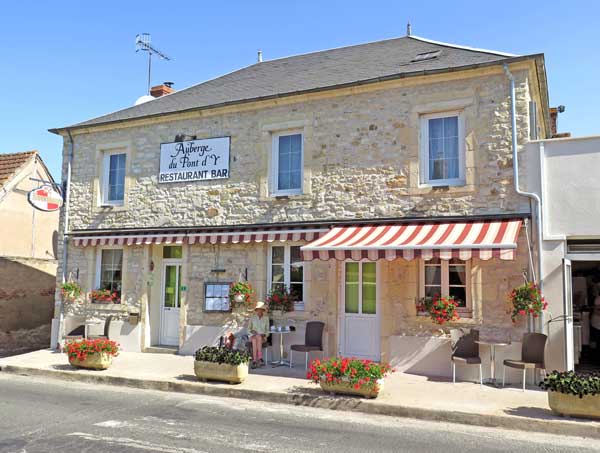
Through the open door we could see cooks preparing tray after tray of little pastries, but one of them interrupted her labours to make coffee for us, and to lower the awning to give us some shade.
After the quietness of the canal, we felt positively cosmopolitan sitting there amongst the tubs of flowers, watching tractors and huge trucks rumble past, loaded high with wheat.
It was a reminder of which century we were actually in.
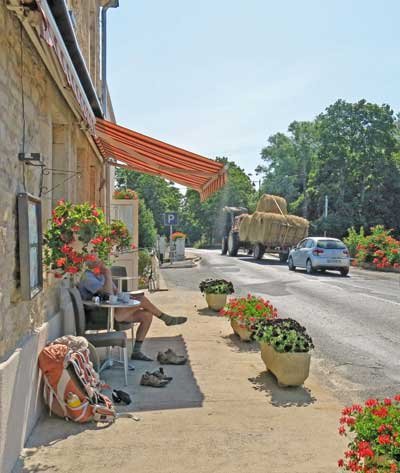
We set off again confidently along the wheel track beside the canal and got as far as the next lock before the wheel track abruptly disappeared into a wall of brambles, impossible to get through.
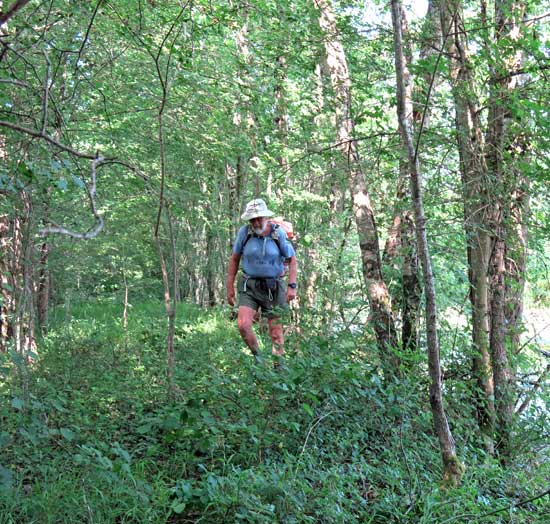
Crossing to the other side of the canal, we found, behind the lock-keeper’s cottage, a grassy track that looked promising and we followed it for a few hundred metres as it got more and more unkempt.
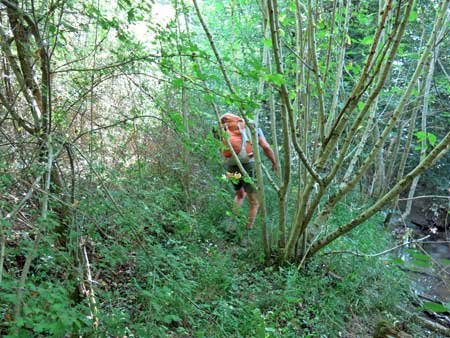
Then it was swallowed up in rampant regrowth. The grass gave way to stinging nettles and blackberries, young saplings reached out thorny arms to ensnare us, and fallen tree-trunks blocked the way.
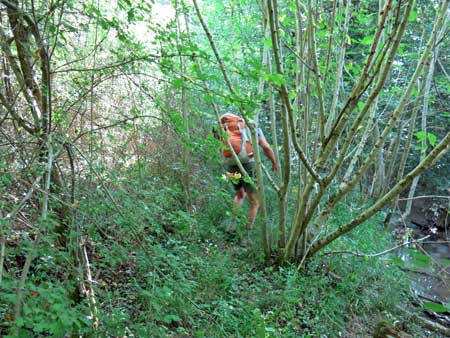
Our arms and legs were soon criss-crossed with bleeding scratches. This went on for a couple of slow, painful kilometres.
Through the tangled branches we could see the half-choked canal on one side and wheat fields on the other, which eventually became a wood. At this point a track came in to join ours, and things improved slightly.
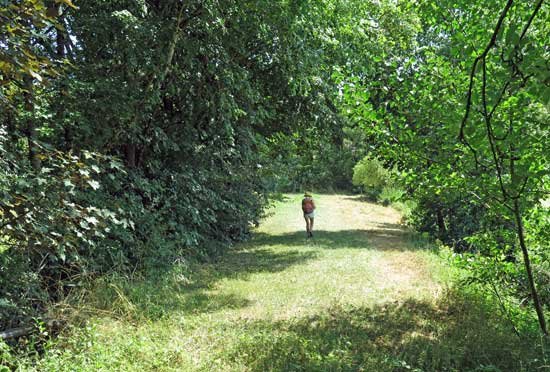
Then without warning we emerged from the gloom into a sunny glade, and a short distance after that we arrived, to our great relief, at a road and a lock (Lavau).
Open fields stretched out on both sides and we strolled thankfully along the towpath in the sunshine, with a line of tall, orderly aspens the only trees in sight. For the moment we had lost our love for trees in their natural state.
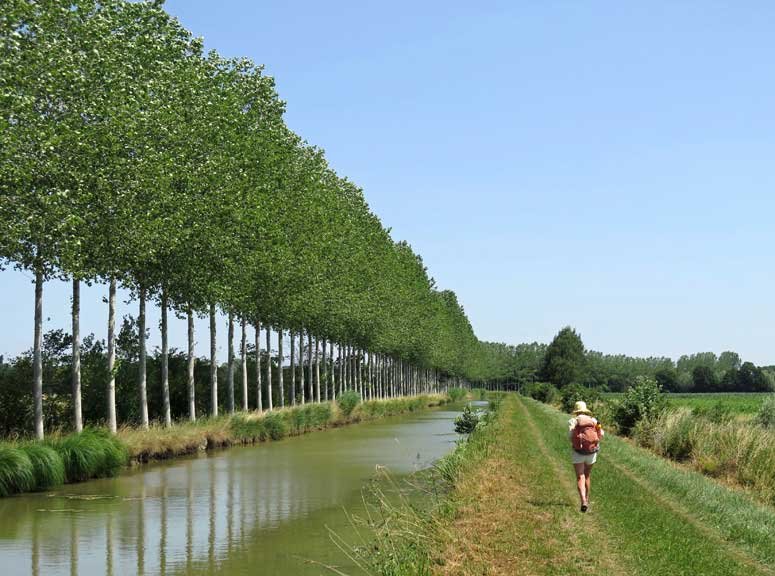
In no time at all we reached the next lock. The towpath ahead seemed to be covered in piles of dead branches from some pruning exercise, so we turned off on a small road through le Petit Vernais and soon arrived at the edge of the village of Bannegon.
Turning left at the war memorial, we wove along the main street, which felt like a mule track despite its lick of tar, to a wide circular area lined with low cottages and shaded by trees.
With a sprinkling of sand over the bitumen it would have made a perfect location for a film set in the seventeenth or eighteenth century.
The only slightly modern element in the square was the bar with its plastic chairs and bright red awning. We sat down thankfully and ordered Orangina.
The barman, Sébastien, was chatty and he told us about the beautiful moated château of Bannegon, which was popular for weddings. He also said that the people at the farm-camping were very nice.
The last part of the day’s walk took us through the rest of the village – uniformly pale, pretty, red-roofed cottages with chimney pots and dormer windows – to a bridge over the river Sagonnin.
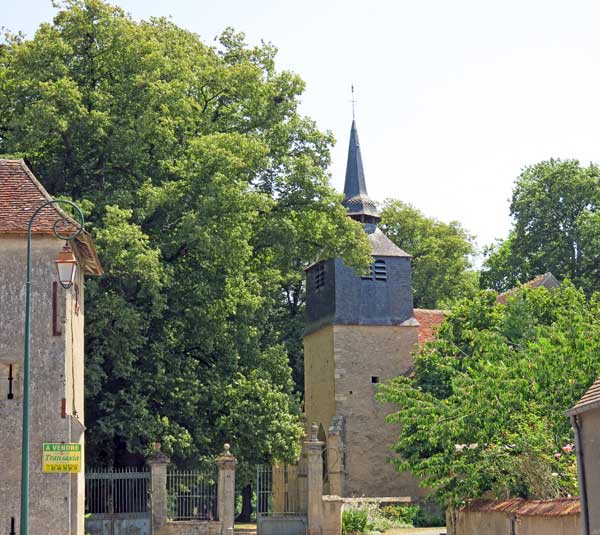
The château was hidden behind trees and we only saw a black guard tower at the entrance.
Past the bridge, we went to the right through wheat fields that would have looked the same in Roman times, and presently turned off past a line of incongruous-looking high-tension wires towards the farm.
It was quite a little village of its own, with a large, sprawling, renovated house, a machinery shed, hay sheds, barns, caravans and several smaller buildings clustered together.
Across the road from the farmhouse were some cabins and a few tents in a fenced area of grass, presumably the camping ground. The only thing missing was people – there was not a soul about, although we knocked vigorously on the house door and looked in all the sheds.
The only thing to do was to retire to the camping ground and hope someone would arrive later. We found a good spot for our tent in a circle of trees, next to a picnic table.
The grass was freshly mown and there were flower beds, little hedges, a barbecue area, a playground, a swimming pool, a cubby house, and an old stone cottage that housed a couple of guest bedrooms.
The shower block was in the same cottage, a fact that took us a while to work out. It was a fine art adjusting the temperature of the shower, which lurched between scalding and stone cold with the smallest turn, but we finally got the knack. Pinned up on the wall was a moving hand-written eulogy to “le petit Nanard”, an old cowherd recently died, who had worked here for years and had become part of the family. “We will miss you terribly, and so will your cows”.
By this time it was 3:30 pm, and as we had not eaten since the croissants in Dun, we had some muesli with apricots for lunch. Afterwards we worried that we should have kept some back, in case the promised cold dinner did not eventuate in the evening.
As we lay on our mats in the shade, with our wet clothes drying on the hedge, a man came over from one of the guest rooms. He was elegantly dressed in a suit and tie, with shiny shoes and a flower in his buttonhole. “This is what I wear when I’m roughing it!” he said jovially.
In fact he was going to a wedding that evening at the château of Bannegon. “Not yours, I hope?” I replied. No, he was already married, and they were relatives of the bride, from Clermont-Ferrand – home of Michelin, he added proudly.
Discovering that we were walkers, he mentioned a place that we should visit in the vicinity – the forest of Tronçais, which was planted in the seventeenth century to supply oak for the royal navy’s ships.
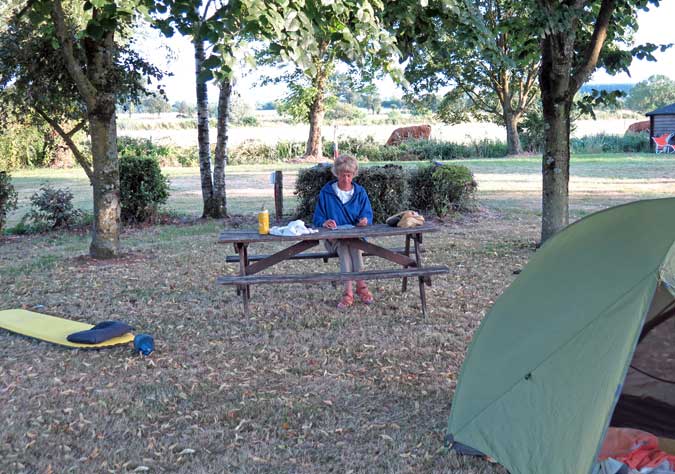
It is used for wine barrels these days, he said. Some of the original trees are still alive – gigantic, half-dead things that are now fully protected.
(We found out later that this forest was not as near as monsieur had implied. It was about twenty kilometres south of here, no distance in a car but a long way for us, and not in the direction we were going.)
As the day declined, three or four families drove up and went into the cabins. The wedding guests departed, and we wondered whether they would be eating the tiny pastries that we had seen being made at le Pondy this morning. By road it was only a few kilometres away, although it had taken us several hours to get from there to here.
Then a car drove up to the house and we galloped over, to find that it was not the farm woman, only her daughter, who was about to leave again. However she assured us that her parents would be home about 7:30. Eventually another car arrived and this time it was the woman of the house. She was just back from work, she said, and would bring our dinner over when it was ready.
Time passed. The other campers ate their dinners and settled down outside their cabins to enjoy the evening. Over the fence a flock of brown cows grazed peacefully in the meadow, and everything was lovely except that we were so hungry.
At 8:45 pm, when we had almost given up hope, the woman came through the gate with another daughter, bearing a veritable feast. First the plates, glasses and cutlery came out of the basket, then a flask of wine, a bottle of ice-cold mineral water, a creamy salad, a baguette, a freshly-cooked hot quiche, a piece of soft aromatic cheese and some slices of melon. We could hardly believe our eyes.
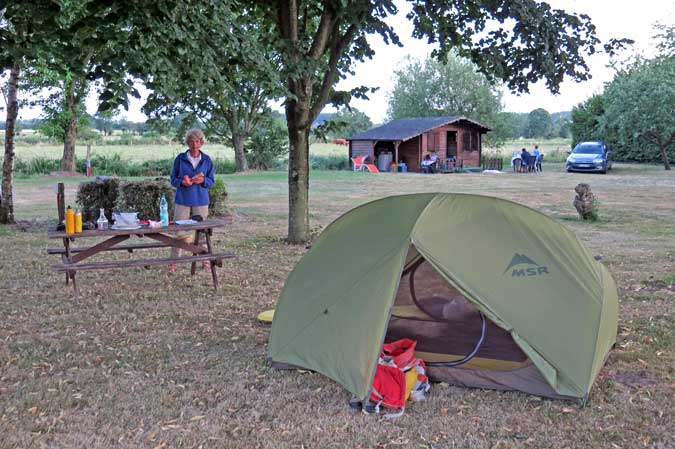
Before descending on the food we settled the bill, explaining that we would be leaving very early in the morning. Madame was keen to at least make coffee for us, but when we mentioned leaving before
The reckoning up of the bill took the form of a glance at our tent (“it’s very small, isn’t it?”) and a few mumbled calculations, after which she said it was €20.50 for everything, accommodation plus dinner. She seemed slightly embarrassed to be asking, although it was incredibly cheap. Up till this point money had never been mentioned.
Farming was hard in France nowadays, she said, and it was necessary to work off the farm to make it pay. She also mentioned that the family had been running this camping ground for 25 years, which made it even more puzzling that the Office of Tourism in Bourges had no knowledge of it.
We went to bed very happy that night, full of good food and looking forward to the last day of our walk for this year.
